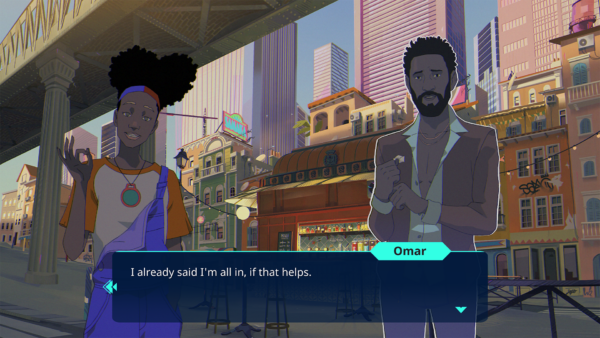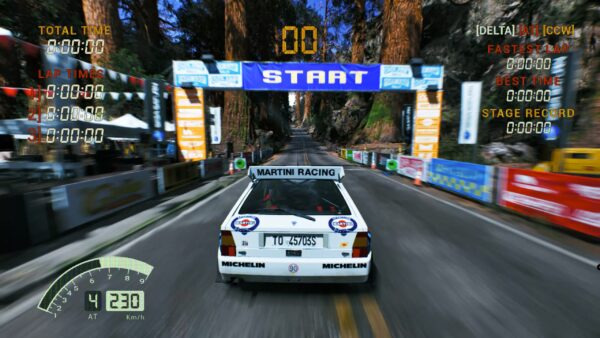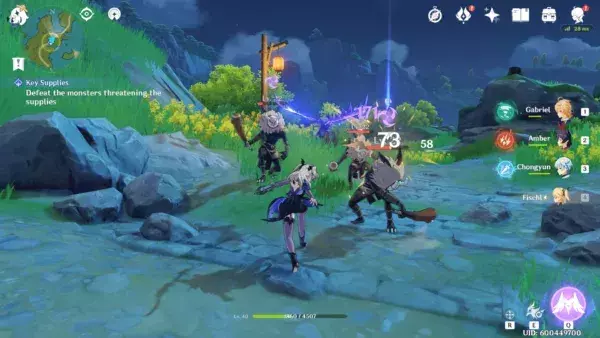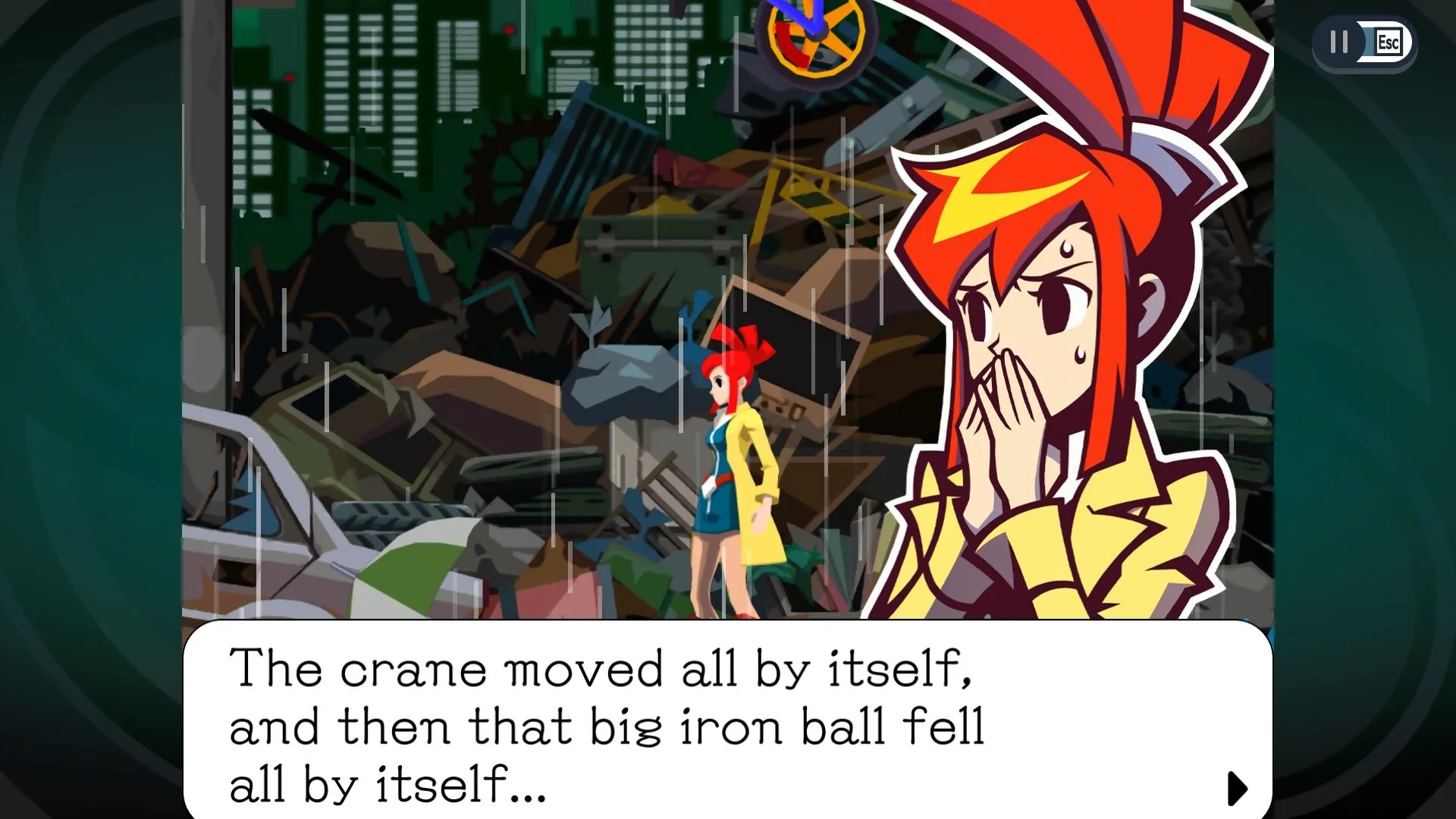
Capcom’s best game that nobody played is making a long-awaited comeback. Don’t miss out on Ghost Trick: Phantom Detective…
Ghost Trick: Phantom Detective is one of those games that caused little splash on its original release, but has only gained in reputation as the years have rolled by.
It was directed by Shu Takumi, creator of the massively popular Ace Attorney series, but it only sold a fraction of Ace Attorney’s numbers. The game Takumi worked on prior to the release of Ghost Trick – Apollo Justice: Ace Attorney – shifted some 250,000 copies on its first week on sale in Japan. By comparison, Ghost Trick managed only around 25,000 when it was launched for the Nintendo DS in June 2010, despite receiving ecstatic reviews.
Nowadays, Ghost Trick is highly sought after. The European version of the game goes for around £50, while the North American version can fetch $100 or more. And its star has risen higher and higher in the 13 years since release, partly helped by the game being ported to iOS in late 2010 in Japan, and worldwide in 2012, gradually opening it to a wider audience.
Given the low sales figures, Capcom didn’t greenlight a sequel: a regrettable, if understandable decision. Takumi instead returned to the Ace Attorney series, working on the two Great Ace Attorney games, which received a well-deserved re-release on Switch, PS4 and PC in 2021. Now, at long last, Ghost Trick is getting the same treatment.
In fact, we’re getting a full-on remaster. Set for release on 30 June on Switch, PS4, Xbox One and PC, Ghost Trick: Phantom Detective has been revived in high resolution, with a rejigged soundtrack and lots more besides.
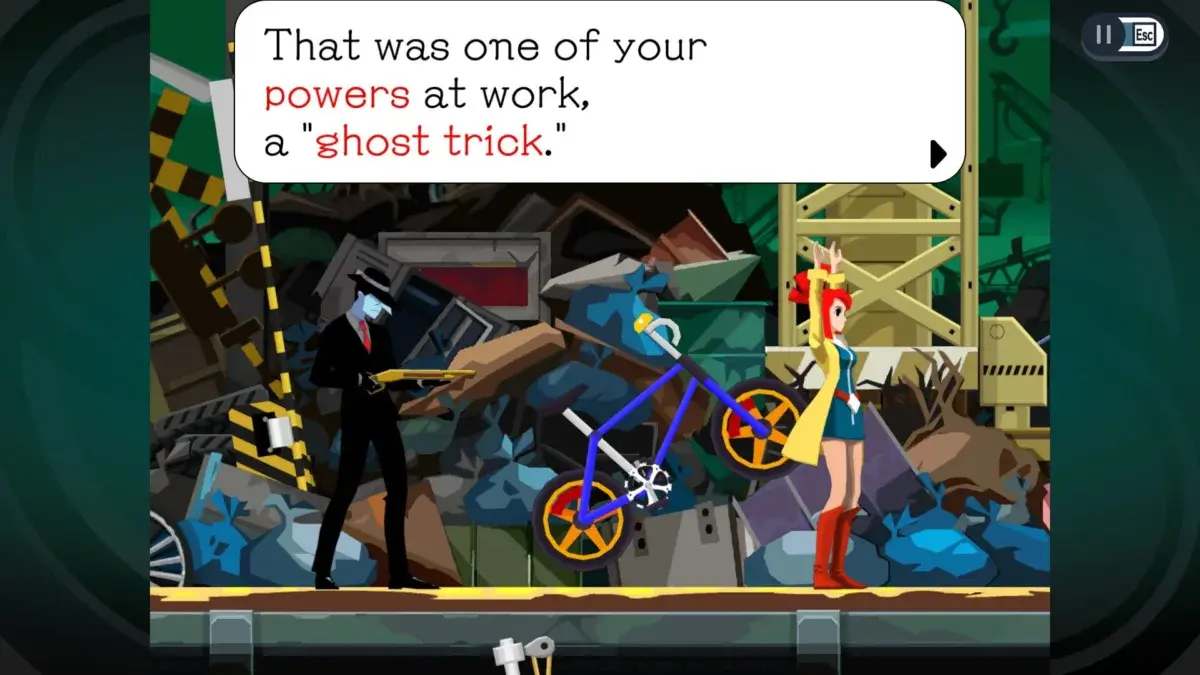
Credit: Capcom.
One of a kind
The reason why Ghost Trick remains so special, and why so many critics hold it in such high regard, is that there really isn’t anything else like it. At its heart, it’s a puzzle game about possession, but with one of the wildest and most enjoyable plots ever committed to silicon.
You play as the beautifully bequiffed Sissel, who realises he has died just as the game begins, although he has no memory of his former life. Soon, a desk lamp called Ray (stay with me) reveals that Sissel’s disembodied spirit can possess inanimate objects and cause them to move. However, we’re not talking poltergeist-like flinging of cups across the room – some objects can’t be made to do anything, while the rest can only be interacted with in limited ways. For example, you might be able to turn on a fan, or ring the bell on a bicycle.
Meanwhile, a gunman is threatening a women in a yellow jacket who is standing by your lifeless body. Ray encourages you to save her. And here’s where the beautiful tension of the game comes in. You’re faced with a life or death situation, but have only limited powers to intervene, nudging the odd object here and there, flicking the odd switch. It’s delightfully infuriating, beautifully encapsulating the helplessness of being a ghost, able to watch but unable to touch.
The timer relentlessly ticks down. When it reaches zero, the trigger will be pulled, and a woman will die. But time only passes in the real world. At the press of the button, you can flick into the ghost world, where possessable objects are highlighted in blue, and time stands still. The aim is to guide your spirit from one object to another, activating or deactivating things to cause effects when you flick back into the real world and time starts up again.
But you’re restricted to possessing nearby objects – Sissel’s spirit can only leap across a limited range. Many of the puzzles revolve around manipulating the environment so that out-of-reach objects fall nearby, creating a route through the level. Sometimes it comes down to timing, flicking into the ghost world at just the right moment so that you can leap into an object moving past.
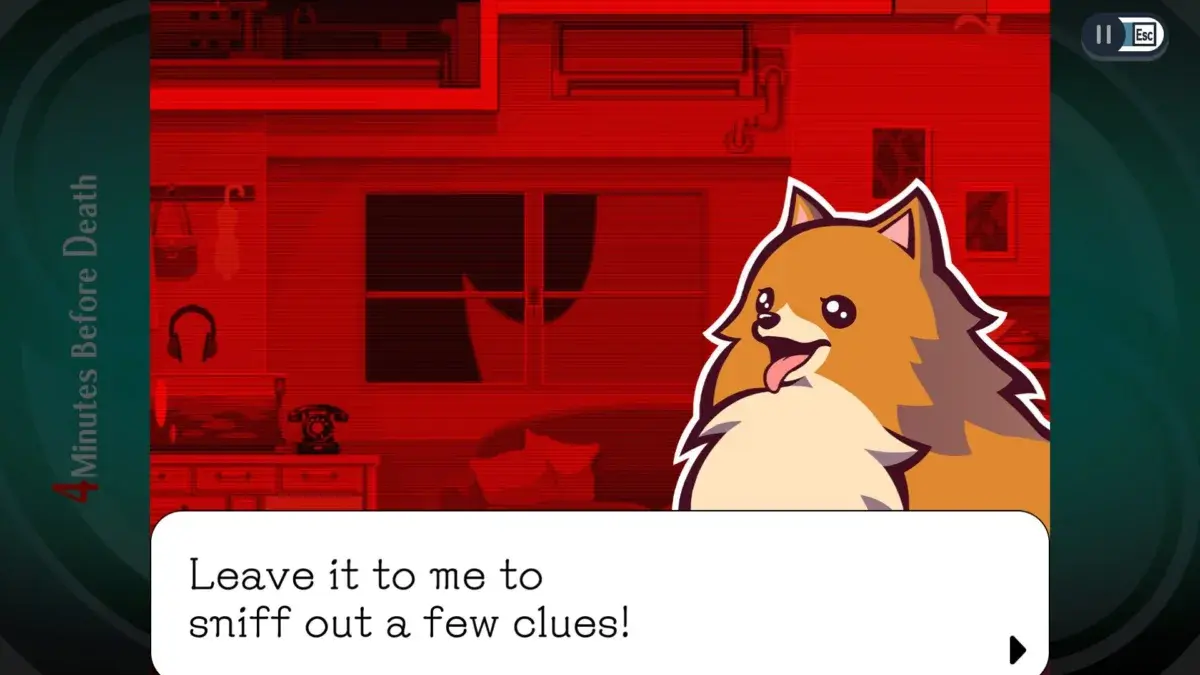
Credit: Capcom.
Your initial efforts come to naught. The woman in the yellow jacket dies, despite your best efforts. But then the game plays its ace. By possessing the body of the recently deceased, you can rewind time to exactly four minutes before their death, giving you a chance to prevent it from occurring. This structure repeats throughout the game, as you watch the events leading up to a murder, then rewind time to stop it happening. The puzzles get more and more complex as you go, to the point where each chapter can feel like a Rube Goldberg machine, with baubles, trolleys, pictures, fans and bicycles careering perfectly, satisfyingly, into one another.
But perhaps the most memorable thing about Ghost Trick is its outlandish plot, where every chapter introduces some new outrageous twist as Sissel seeks out the reasons behind his murder. Shu Takumi is an absolute master at this, as anyone who’s a fan of the Ace Attorney games will know, with their joyfully ridiculous turns of fortune. If anything, Ghost Trick takes this to the extreme, with an absolute peach of a twist ending that still sticks with me all these years later.
The characters, too, are some of the best Takumi has ever created, from loveable talking Pomeranians to comedy generals. Like in Ace Attorney, where one of the biggest joys was waiting to see what bizarre character would turn up next in the witness stand, here you’re treated to a smorgasbord of oddballs, a cavalcade of the strange. Every new character reveal is a delicious treat to be savoured.
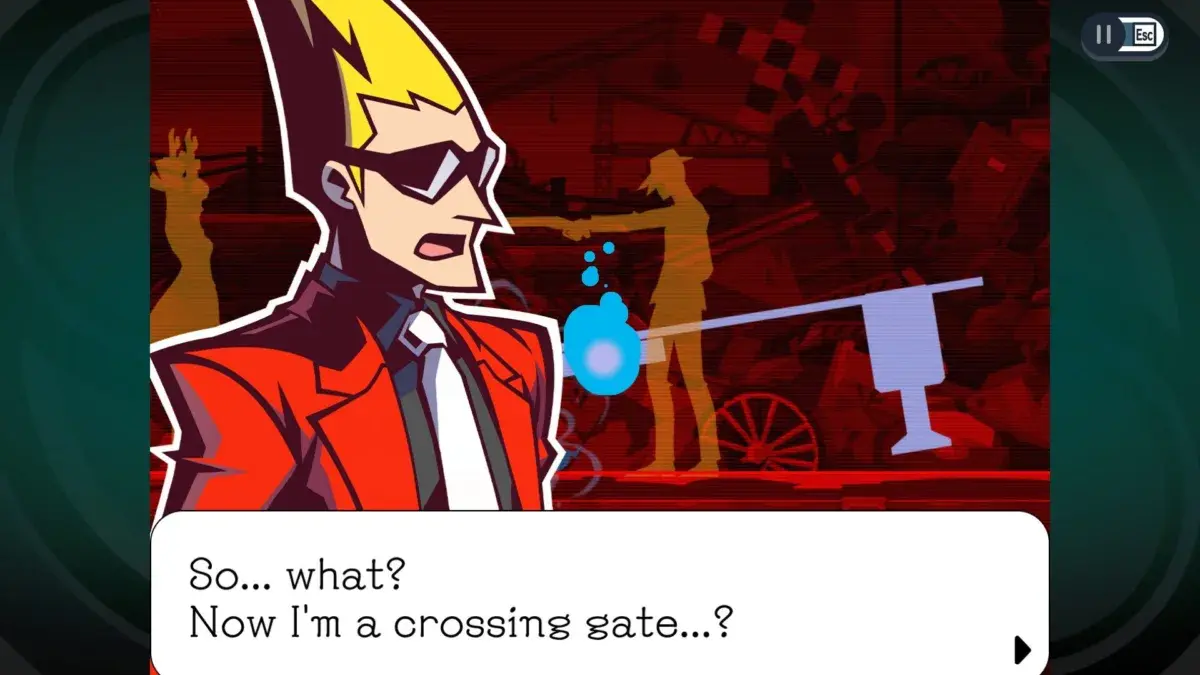
Credit: Capcom.
Light-touch remaster
The highest complement that I can pay to this new, remastered version of Ghost Trick is that I didn’t notice the difference. When playing through the hour-long preview code, I could have sworn that nothing had been changed, that this was exactly the same game I played and loved all those years ago, with the same gorgeously characterful graphics and super-smooth animation. It was only when I went back and looked at videos of the original game that I got a shock, seeing just how pixellated those old DS screens appeared. They don’t look like that in my memory.
That’s the sign of a thoughtful remaster, in my book. Precisely preserving the original feel, but adding a bit of spit and polish to take advantage of modern processing power. The same thoughtful touch has been applied to the music, too. All of the game’s tracks have been newly rearranged by Yasumasa Kitagawa, who did the soundtrack for The Great Ace Attorney. Again, at first, they sound the same as the original – but listen to the new and old tracks side by side, and suddenly it’s apparent how much more depth the remastered versions have, how many more layers.
It’s the quintessential example of a careful, light-touch remaster, of polishing what’s already there rather than adding unnecessary flourishes.
Speaking of unnecessary flourishes, the optional sliding tile puzzles from the smartphone version have returned. I’m not quite sure why they were added in the first place, so let’s just leave that there. But one welcome addition is an art and music collection that fills out as you play through the game, including some previously unseen concept art, as well as the aforementioned soundtrack.
It’s been a long time coming, but finally Ghost Trick is being sprung from Capcom’s vaults, giving a whole new generation the chance to play what is very possibly Shu Takumi’s finest work. I, for one, dearly hope it sells well enough for Capcom to consider a sequel. The world would be a better place with more Ghost Trick games in it.
Ghost Trick: Phantom Detective releases on 30 June 2023 for PC, Nintendo Switch, PS4 and Xbox One. The playable demo is available now.
Read more: The three pillars of investigative gameplay


